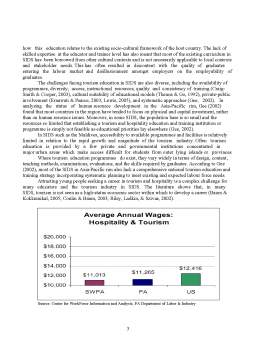Extras din referat
ABSTRACT
The concept of sustainable tourism has been advocated as a means of maximising tourism’s benefits while minimising some of the negative impacts associated with tourism development. Education is crucial in responding to the broader issues within tourism development that affect the wider society (Lewis, 2006).
However, in many Small Island Developing States (SIDS), the focus of sustainable tourism development usually only extends to tourism policy, planning and infrastructural development, and in many cases, tourism and hospitality education is either ignored or is not given sufficient emphasis at the policy level.
The extent to which education is incorporated at the tourism policy and planning stage could be crucial in achieving sustainable development outcomes, as well as improving the overall human development status of many SIDS. This paper explores the development of tourism and hospitality education in the Maldives highlighting the sustainable development issues facing the educators, government, the tourism industry, and local residents.
INTRODUCTION
Few industries have as strong an impact on the global community as the tourism industry.
According to the World Tourism Organization (WTO) the number of international arrivals shows an evolution from a mere 25 million international arrivals in 1950 to a record 842 million in 2006 generating an estimated worldwide receipts of US$736 billion (WTO, 2007a; 2007b).
The WTO’s Tourism 2020 Vision forecasts that the number of international arrivals worldwide will increase to almost 1.6 billion, and receipts from tourism (excluding transport) are projected to reach US $2 trillion by 2020 (WTO, 2001). Such figures highlight that tourism is arguably the world’s largest and fastest growing industry and Goeldner and Ritchie (2006) have claimed that tourism has virtually embraced all aspects of human society. Not surprisingly, the industry employs in excess of 234.3 million people worldwide (WTTC, 2006), representing some 8.7 percent of the total global workforce.
Whether measured in terms of tourism’s contribution to gross domestic product, foreign exchange earnings, capital investment, or tax contributions, it is the job-creation capacity of the
tourism industry that is its most significant feature (Baum, 2006a; Conlin & Baum, 2003; Sharpley, 2002; WTO, 2002; WTTC, 2002).
Education is at the core of successful and sustainable tourism development and has been identified as a “critical element” (Lewis, 2005, p.5) for SIDS. As the design and delivery of quality tourist experiences remains a key task for tourism professionals (Morgan, 2003), a well- educated and well-trained workforce is crucial in achieving comparative advantage in this highly volatile and competitive global tourism industry. However, for many SIDS, such as in the Maldives, the sustainable development of the tourism industry is constrained by unskilled employees and an acute shortage of skilled labour.
TOURISM IN SIDS
Characterised by their small size and geographic isolation, SIDS have been historically reliant
on traditional industries such as agriculture and fishing for their economic survival (Freitag, 1994; Hall & Page, 1996).
Inadequate natural resources, fragmented small economies, and a vulnerability to exogenous factors such as natural disasters and global market shifts (Belle & Bramwell, 2005; Croes, 2006; Douglas, 2006; Mowforth & Munt, 2003), have meant that SIDS, like developing countries, often have no other viable economic alternatives to improve their marginal economic status (Brown, 1998; Croes, 2006; Liu & Wall, 2006).
Therefore, the opportunities afforded by tourism have enticed many SIDS to embrace the tourism industries as very often, tourism represents the only viable means of earning much needed foreign exchange, creating employment and attracting overseas investment (Sharpley, 2002).
Archer, Cooper, and Ruhanen (2005) argue that tourism seems to be more effective than other
industries in generating employment and income in the less developed regions of a country where alternative opportunities for development are more limited. However, in SIDS such as the Maldives, the extent to which tourism has been sought as a development option and a source of national revenue has all but destroyed many traditional industries (Shakeela, 2002).
If the tourism industry expands at a faster rate than that of the human resources development of the country, the full benefit of tourism is not tapped as significant economic leakages out of the local community occur in the form of expatriate employment, reducing the net benefits of tourism (Boniface & Cooper, 2005). In this view, “the industry and the government need to consider the development of human resources as a strategic, long term investment which is absolutely necessary for the survival and growth of tourism” (Conlin & Titcombe, 1995, p.66).
TOURISM AND HOSPITALITY EDUCATION IN SIDS
Zimmermann (2006) points out that sustainable tourism management needs to involve local communities. This supports Jamieson’s (2003) view that sustainable tourism development requires the establishment of education training programmes to improve public understanding and enhance business, vocational and professional skills especially for the poor and women.
Preview document
Conținut arhivă zip
- Tourism and Hospitality Education.doc



















